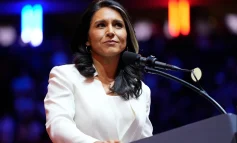WASHINGTON — Scores of Middle East and democracy experts released an open letter to U.S. President Barack Obama Tuesday asking him to focus more of his foreign policy efforts at making reforms in the region, including boosting human rights.
Signed by over 120 academics, scholars, experts and others, the letter said that previous U.S. policy had been “misguided” and “produced a region increasingly tormented by rampant corruption, extremism, and instability.”
The signatories, ranging from liberal Democrats to neoconservatives, called for the Obama administration to “encourage political reform not through wars, threats, or imposition, but through peaceful policies that reward governments that take active and measurable steps towards genuine democratic reforms.”
In doing so, the letter said the U.S. should end its “fear of Islamist parties coming to power” because most of them are “nonviolent and respect the democratic process.”
Citing Egypt, Jordan and Saudi Arabia, the group said “the U.S. should not hesitate to speak out in condemnation when opposition activists are unjustly imprisoned.”
The letter was coordinated by Radwan Masmoudi of the Centre for the Study of Islam and Democracy; Shadi Hamid of the Project on Middle East Democracy; Geneive Abdo of the Century Foundation; Michele Dunne of the Carnegie Endowment for International Peace; Stanford University professor Larry Diamond; and Freedom House’s Jennifer Windsor.
The conventional wisdom in Washington is that Obama has scaled back the lofty rhetoric delivered by his predecessor, George W. Bush, about “promoting democracy” across the globe, albeit in a style that many critics charge was selective and hypocritical.
While Bush spoke glowingly of elections in Iraq, for example, he rallied forces against an elected government in the Palestinian Authority containing the unpalatable Hamas, and, in the name of stability, maintained relations with authoritarian dictators like Egyptian President Hosni Mubarak.
What the signatories are asking for is not a “continuation” of Bush policies, but instead “a new initiative” for democracy in the Middle East, said Geneive Abdo, a former journalist and fellow at the Century Foundation, at a press briefing launching the letter.
Abdo, an expert on Islamic studies, told a packed room of reporters at the National Press Club Tuesday that the repressive political situation in the region should not be seen as a battle between Islamism and authoritarianism.
She pointed out that opening up the political process will force all parties — not just Islamists — to be “more accountable to their electorate and republics.”
Citing specifically examples in Turkey, Indonesia, and Morocco, the letter said that, despite disagreement with some illiberal Islamist viewpoints, “the right to participate in reasonably credible and open elections has moderated Islamist parties and enhanced their commitment to democratic norms.”
“There is no system I know where Islamists put in power by democracy have canceled elections,” said Saad Eddin Ibrahim, an Egyptian democracy activist, as he rose from a chair provided for him on the dais, apologizing for his bad legs due to torture he received in prison.
But embracing Islamists as legitimate political actors and democratic forces will have far-reaching goals for U.S. policy — from the commonly named case of talking with a potential unity government in Palestine containing Hamas to negotiating with other religious groups like relatively moderate elements of the Taliban in Pakistan and Afghanistan.
Stanford University professor Larry Diamond said that in retrospect, those decisions aren’t always as difficult as they seem. At the press briefing, he looked to the example of the Sahwa, or Awakening movement, in Iraq, which co-opted former Sunni insurgents.
The members of the Sahwa, said Diamond, had almost certainly committed horrific acts against the U.S. and its allies, including possible terrorism, but the move to incorporate them is widely seen as having drastically improved security and stability there.
What’s clear from the letter and press conference, however, is that not making mention of human rights and democracy — or more strikingly, playing down expectations for them, as Secretary of State Hillary Clinton did on a recent trip to China — is unacceptable for U.S. goals around the globe.
“This is urgently in the American national interest,” said Diamond, echoing the common criticism that repealing a predecessor’s policy is not enough. “We don’t have a policy now. Simply rejecting what Bush did is not a policy.”
Diamond suggested that if the administration was serious about promoting democracy, it would begin crafting country-by-country policies.
At the press briefing, the signatories on hand said that, as well as diplomatic measures, so far absent in Clinton’s recent trips through Asia and the Middle East, economic measures could be taken to pressure for reform.
The groups suggested making economic aid conditional upon democratic and human rights reform — a tack that is not unprecedented. But Michelle Dunne, an expert on Arab politics, said that such pressures would need to be undertaken delicately without being too “blunt.”
Dunne also cautioned against “picking players” and said that the whole focus on democracy was that the people of nations needed to choose their representatives for themselves.
The strength of the letter, said Diamond, was that it was not only a bipartisan effort, but more importantly, the signatories cut across ideological lines. (IPS)





Leave a Reply